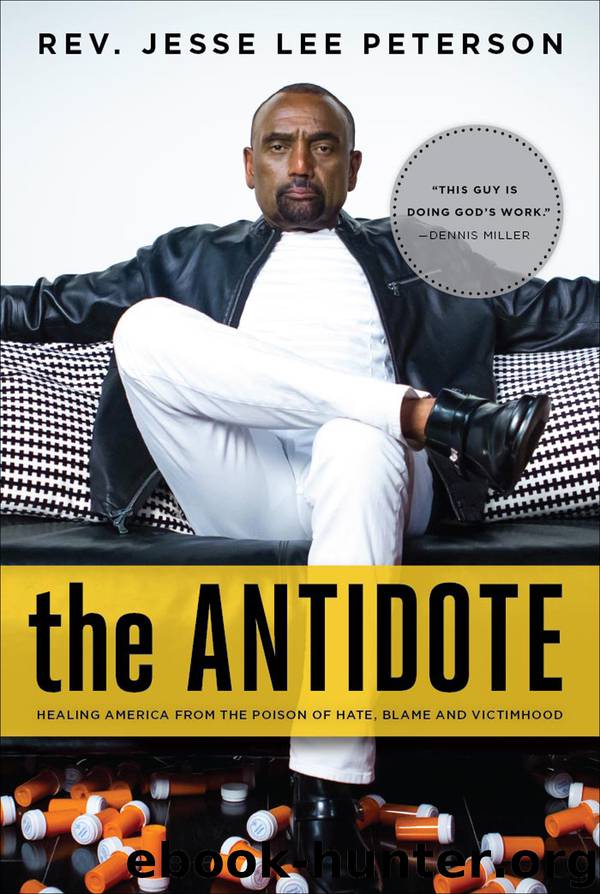The Antidote by Jesse Lee Peterson

Author:Jesse Lee Peterson
Language: eng
Format: epub
Publisher: WND Books
Published: 2015-07-16T16:00:00+00:00
15
OUTSIDE LOOKING IN
The man peering through the window of his ex-wife’s condo on South Bundy had a secret that very few knew. His father, “Sweet Jimmy” Simpson, had decided that the gay scene then brewing down the hill in San Francisco’s famed Castro district was much more enticing than his dreary life with Eunice and the four kids in the housing projects up above on Potrero Hill. So Jimmy “came out,” which was bad enough, and then he took off, which was even worse. He left the management of his son, Orenthal James, in the hands of his wife, Eunice.
But try as she might, Eunice could not teach young O. J. to be a man.1
O. J. never talked publicly about his father’s sexual proclivities. I can understand why. One of the worst traumas for a boy is to discover his father is gay. To make matters worse, Sweet Jimmy Simpson reportedly became a drag queen and later died of AIDS.
O. J. had to know what his father was up to, but he probably did not want to reflect on it. Given what the world learned of Simpson, it became clear he had little confidence in his own masculinity. He was hardly unique. The absence of fathers in the black community has left many a young boy having no one else to identify with but his mother or grandmother, and these women, intentionally or not, often turn their sons and grandsons against their fathers. These boys may not be “gay,” but in identifying with the women in their family, they lack the strength and resolution to become the man society needs them to be.
Dr. David Gutmann, a psychology professor at Northwestern University, was the very rare academic to talk about what went wrong in Simpson’s early life. He believes that every boy needs a “true patriarch” in his life. I was fortunate to have one in my grandfather. At BOND we teach young men to become patriarchs. One fellow, Marquis, entered our counseling program because he had had enough of the empty bravado of false masculinity. He did well in the program and summed up his accomplishment. “I am so glad I am a man,” he told me. “I love being a man” – not the man, a man.
Simpson, like so many young boys today, did not have a patriarch in his life, at least not when he needed it most. According to Guttman, it is the patriarch who shows a boy how to move beyond his mother’s apron strings and into the world as a mature young man, one capable of disciplining himself and making decisions with long-term impact. Boys without such a patriarch find what Guttman calls “less trustworthy ways” to distance themselves from their mothers. “Physical distance,” says Gutmann, “they achieve by flight: from the mother’s home to the streets, to the fighting gangs that rule them and, at the end of the day, to the all-male fraternity of the penitentiary.” They achieve social distance “by moving out of the mother’s cultural world, and off her scale of values.
Download
This site does not store any files on its server. We only index and link to content provided by other sites. Please contact the content providers to delete copyright contents if any and email us, we'll remove relevant links or contents immediately.
The Compound Effect by Darren Hardy(8949)
Tools of Titans by Timothy Ferriss(8369)
How to Be a Bawse: A Guide to Conquering Life by Lilly Singh(7472)
Deep Work by Cal Newport(7068)
Wiseguy by Nicholas Pileggi(5771)
Grit by Angela Duckworth(5605)
The Slight Edge by Jeff Olson(5410)
Discipline Equals Freedom by Jocko Willink(5381)
The Motivation Myth by Jeff Haden(5206)
The Laws of Human Nature by Robert Greene(5182)
Influence: The Psychology of Persuasion by Robert B. Cialdini(4782)
Year of Yes by Shonda Rhimes(4755)
The Miracle Morning by Hal Elrod(4716)
The Four Tendencies by Gretchen Rubin(4595)
Eat That Frog! by Brian Tracy(4526)
The Confidence Code by Katty Kay(4251)
Hyperfocus by Chris Bailey(4112)
Visual Intelligence by Amy E. Herman(3778)
The Inner Game of Tennis by W. Timothy Gallwey(3682)
